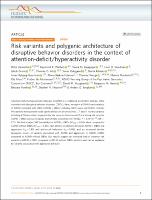Risk variants and polygenic architecture of disruptive behavior disorders in the context of attention-deficit/hyperactivity disorder
Resum
Paraules clau
TDAH; Genoma; Estudis d'associació ample
Citació recomanada
Demontis D, Walters RK, Rajagopal VM, Waldman ID, Grove J, Als TD, et al. Risk variants and polygenic architecture of disruptive behavior disorders in the context of attention-deficit/hyperactivity disorder. Nat Commun. 2021 Jan 25;12(1):576.
Audiència
Professionals
Empreu aquest identificador per citar i/o enllaçar aquest document
https://hdl.handle.net/11351/6200Aquest element apareix a les col·leccions següents
- HVH - Articles científics [2966]
- VHIR - Articles científics [1200]
Els següents fitxers sobre la llicència estan associats a aquest element:

